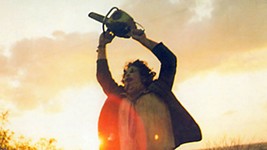This Kitty's Got Claws
Teeth tears into everything from abstinence programs to rape culture. Is Austin grownup enough to handle it?
By Melanie Haupt, Fri., Jan. 25, 2008
The scene: Saturday night, Alamo Drafthouse South Lamar, the sold-out 7:30 screening of Juno. The hipsters on dates and mommies on an evening pass pulled on pints and giggled over glasses of wine as the theatre darkened for the trailers. And there it was in all its somewhat-deceptive intensity: the preview for Teeth, which was filmed locally, to some controversy. "There's something wrong with me," wails a teenage girl in voiceover as a towel-clad young blonde sits at the edge of a bathtub, clutching her crotch. "Dentata," she hisses, her voice trembling in fear and dismay. The audience titters; a few men groan. "Eww!" a woman protests, realization dawning. The laughter grows louder as the film's tagline fades in: "Every rose has its thorns." Cue outright guffaws.
It seems that, even in our ultraprogressive 21st century, vaginas – even fictional ones – have a way of making people uncomfortable.
Teeth is, simply put, a horror-comedy about a chaste teenage girl who discovers, quite by accident and in a rather grisly circumstance, that she has teeth in her vagina. The myth of the vagina dentata is a pervasive one across temporal, cultural, and geographic borders, from certain Plains tribes of the Americas to Christians in the Middle Ages, Shelob the spider in Lord of the Rings, and Sarlacc, the desert-pit-dwelling creature from which Luke Skywalker rescues himself in Return of the Jedi. The term is often attributed to Freud, who spilled much ink on men's castration anxiety and spoke to a primal male fear of the female sex organ. According to the myth, the hero must conquer the vagina dentata, thereby rendering her a more appropriate receptacle for the male organ.
Feminist film theorist Barbara Creed writes, "The myth about woman as castrator clearly points to male fears and fantasies about the female genitals as a trap, a black hole which threatens to swallow them up and cut them into pieces." It is precisely this gynophobic myth that captured writer/director Mitchell Lichtenstein's imagination, one he decided was due some tweaking, inserting his narrative alongside films like Carrie and Ginger Snaps into a genre well-versed in fear of young, female sexuality.
"The pervasiveness of the myth in so many cultures does say something about primal male fear, and it does say something about men and their attitude toward women," he says. "The goal was to take a misogynist myth and turn it around." Lichtenstein does so by writing his heroine, Dawn (played with admirable intensity by newcomer Jess Weixler), as a naif who slowly learns to accept and love her body, especially the power it enables her to exert over men who might attempt to violate her or add her to a list of conquests. Along the way, Lichtenstein, son of the prominent pop artist Roy Lichtenstein (who, coincidentally, is the subject of a current exhibit at the Austin Museum of Art), takes jabs at teenage abstinence movements, as well as a Lynchburg, Va., school board that insisted upon censoring the image of a vagina in a high school textbook. According to Lichtenstein, these little digs at the right wing are all metaphors for Dawn and her complicated relationship with her body.

"These abstinence groups want to delay experience and restrict knowledge," he explains. "It seemed to me that it would make perfect sense for her to join such a group." Lichtenstein also notes that the abstinence movement sends teens – especially girls – into the world ill-prepared for the vagaries of hormonal surges, something Dawn experiences firsthand and with no small amount of trauma. "Research shows that the [abstinence] movement doesn't really delay sexual activity for very long, and when you fall off the wagon, it's spontaneous. The girls don't know about birth control and are more likely to get pregnant." Or, in Dawn's case, likely to discover that her va-jay-jay is full of den-tay-tay, which is initially a frightening liability but, by the film's end, is an asset when she finds herself vulnerable in the face of salacious dudes.
Kirk Honeycutt of The Hollywood Reporter writes that Teeth "is the most alarming cautionary tale for men with wandering libidos since Fatal Attraction." And yes, it is fun to play a bit of wink-nudge in regard to a movie about a girl whose cooch bites off unwelcome penises (and fingers), but such subject matter is not without its ethical and political problems.
While it's all well and good to reimagine and defang a hateful cultural construct, such an act has the potential to turn back upon itself, thus undermining the power and intent of said reimagining. For example, many feminists might have a problem with the fact that sex (or, more accurately, her vagina) is the only site of Dawn's power, a classic no-no within the world of feminist rhetoric. And while queer theorists might argue that penetration as passivity is merely a construct of the patriarchy, Dawn must be penetrated in order to exert her power, which some might argue neutralizes her agency. Weixler, whose turn in Teeth won the Special Jury Prize for Acting at Sundance last year, sees things differently.
"She comes away fairly scot-free metaphorically in that she never gets blood on her; blood is always on the guy. She's able to step out of it knowing that she took their weapon away. It's not so much, 'Oh, they penetrated me'; it's like, 'You don't deserve to have this anymore because you keep abusing it.'" Within Lichtenstein's fantasy world, the toothed vagina serves a policing function. According to this logic, one could argue that rape as a social, rhetorical construct serves to police women's bodies and behaviors (a woman is "asking for it" if her skirt is too short/she's walking alone at night/she has too much to drink/she flirts too much); in this way, the vagina dentata serves the same sociocultural purpose that rape does. That the film's solution to male violence against women is horrific, violent revenge is cold comfort.
Lichtenstein is quick to acknowledge the am-bivalence and problematic nature of his subject. "I definitely see that it can be controversial; the very fact of a character embodying the original gynophobic myth is gonna be risky. And my big fear is that it would be taken as misogynist," he says evenly. "There is always the danger, since you're dealing with the same thing, of it being exactly what you're talking about."
On the other hand, engaging in such subject matter reveals to a community its own vestigial fear and loathing of the yoni, as evidenced by the twittering reactions to the film's trailer at the Alamo Drafthouse. Lichtenstein cites numerous factors in his decision to film Teeth in Austin, from the favorable weather conditions that made filming outdoor swimming scenes possible in early spring to the availability of a seasoned local crew. However, it was Hamilton Pool's "naturally formed vagina dentata, the overhang with the stalactites," in combination with Krause Springs, that was the deciding factor in choosing this location. Funny, then, that residents of a progressive town like Austin would get their panties in a twist about this movie.
Windsor Park is one of those Eastside neighborhoods euphemistically described as "in transition." In other words, the upwardly mobile yuppies with small children and disposable income are snapping up the real estate and putting down roots (or flipping midcentury modern homes at rather outstanding profits). It's a haven for lefties who plant Obama and Edwards campaign signs in their front yards and recycle assiduously. By all accounts, most residents in the blocks surrounding the corner lot that served as Dawn's celluloid home considered it pretty cool that a movie was in the works in the 2-3. However, word got out – vaguely – that the movie was about a girl with teeth in her vagina, and two and two quickly became five. "I think the neighborhood was like: 'They're making a porn. It's about a vagina; it must be porn,'" says Weixler. "They didn't care about reading the script; all they needed to know was that it had to do with a vagina with teeth." Windsor Park resident Silver Chisum raised the hue and cry and got others on board, calling news crews to the scene of the imagined crime. Eventually, then-newly appointed Texas Film Commission Director Bob Hudgins had to step in and hose down the controversy, asserting that "it's in incredibly bad taste, but it's not pornography."
This incident reveals that some of us still regard vaginas as unclean things that should remain wrapped in chaste cotton. Perhaps what Lichtenstein is suggesting with his film is that to marginalize and pathologize the vagina is to run the risk of underestimating its profound power. Tom Cruise in Magnolia told us to "respect the cock!" Perhaps we should apply the same philosophy to the lady garden, because you'll never know when your snake will get bitten.













